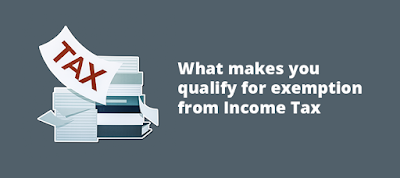Tax exemption can be called to be a monetary change that
will reduce the taxable income to save additionally. Tax exemption
can guarantee relief from taxes within a legible time-frame. Tax exemption can
easily provide tax relief, less taxes and a demarcated portion of taxable
items. This is basically removal or deduction that is counted as tax exemption.

Are Some People Really Exempt from Paying Taxes?
How does it work?
As individuals, we always wish to have more of tax
deductions and income. Greater your income, more would be the taxes. However,
there is one category of income, which is devoid of taxes.These income
categories are not added to the current assessment year and thereby are tax
free. Section 10 of the Indian Income Tax Act of 1961 regulates this category
of income to exempt it from taxes.
10 Types of Incomes do not attract Income tax:
Agricultural income
India’s economy is majorly dependent on the agricultural
business. In general, any act of encouragement towards this sector will be
considered beneficial for the overall economy. The Indian Income Tax Act of
1961 exempts all incomes generated from agricultural income. It is important to
note that the agricultural income is included during calculations for the
limited purpose of determining the tax burden if at all net agricultural income
exceeds Rs 5,000.
Funds from Hindu Undivided Family
Under Section 10(2) of the Income Tax Act, the amount
received from family income, or in case of an estate property, the amount from
the HUF member is exempt from tax. HUF is a different entity under Income Tax
Act, 1961
Interest received on savings bank
Interest received on savings account is up to a maximum of
Rs 10,000 annually and is deducted under Section 80TTA. This, obviously does
not make it exempted.
Shares of a partnership firm
If you have a partnership firm, then the total income from
this firm will be exempted from tax. Under section 10(2), any partner is not
obliged to pay taxes on the income received from a partnership firm. However,
anything excepting profits are taxable in the hands of Income Tax.
Read more: Virtues of Tax Saver Investment
Allowance for foreign services
An Indian resident providing service outside the country and
receiving any allowances will remain tax free under Section 10(7) of the IT
Act. This section allows the government to accumulate tax-free allowances that
might come to them working outside India.
Long-term capital gains
At this point in time, long-term capital gains (LTCG) from
the sale of equity shares and equity mutual funds with an on an STT is exempt
from tax, which means that any earning from sale of equity for about a year
will not attract any taxes. The budget says that LTCG will be taxed at 10% for
all listed equity stock where STT is paid on purchase and sale. Since, STT is
paid/deducted if you are wanting to sell your equity MF again to the MF, then
the new LTCG regime will be applicable now. For unlisted STT, the LTCG tax
regime will remain the same.
Allowance for foreign services
Any Indian resident rendering service outside the country and
receiving any allowances or perquisites outside the country remain tax free
under Section 10(7) of the Income Tax Act.
Income from gratuity
Gratuity is essentially a token of an individual’s long term
serving period at a place. Any part of this gratuity is not parted with as
taxable income.
For non-government employee, the Gratuity Act of 1972 is
exempted for the following 3 items:
· 15
days salary based on the last drawn, every year
· Rs.
10,00,000
· Total
gratuity received
Scholarships and awards
Any scholarship or award provided to cover the education
cost will be exempted from tax under Section 10(16) of the IT Act,1961. There
is no maximum threshold on the amount to be received as scholarship.
Amount paid under voluntary retirement
Any
amount at the time of voluntary retirement under Rule 2BA of the Income Tax
Rules gets tax exemption up to Rs 5 lacs.
No comments:
Post a Comment